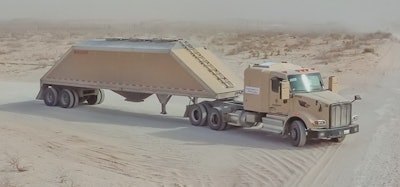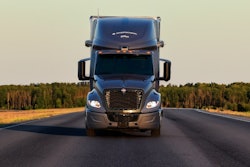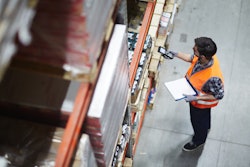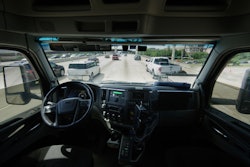
Trucking news and briefs for Friday, Sept. 12, 2025:
Roush Industries delivers first upfitted autonomous truck since Kodiak partnership
Roush Industries and autonomous truck tech developer Kodiak Robotics announced the delivery of the first Kodiak Driver-equipped autonomous trucks off of Roush’s production line. The companies announced earlier this year that Roush would upfit trucks with the Kodiak Driver system.
The truck, which Roush upfit at its Livonia, Michigan, facility with the Kodiak Driver, was delivered to Atlas Energy Solutions Inc. in August.
In December 2024, Atlas began taking delivery of Kodiak Driver-equipped trucks and launched driverless operations in the Permian Basin. To date, Atlas has taken delivery of eight Kodiak-powered driverless trucks, as part of an initial 100 truck order under their agreement with Kodiak.
"Taking delivery of the first Roush-upfitted truck is another example of how the future of freight is arriving," said Don Burnette, founder and CEO, Kodiak. "The speed and quality of Roush's work confirm why we are confident they're the right partner to help us transform the freight and logistics market at scale. Together, we believe we are well positioned to transform the trucking industry."
Since the companies’ announcement of their partnership in June, Roush has established a dedicated production line to scale the upfitting of trucks equipped with the Kodiak Driver's modular and vehicle-agnostic hardware. The manufacturing process includes upfitting trucks with the Kodiak Driver's modular, vehicle-agnostic hardware, including its proprietary SensorPods, AI compute, Actuation Control Engine (ACE) safety compute, and redundant actuation systems. Roush and Kodiak intend to scale production into the hundreds of trucks by the end of 2026.
"Delivering the first Roush-upfit truck shows how our contract manufacturing process can meet Kodiak's high standards while supporting its ability to scale," said Brad Rzetelny, VP Contract Manufacturing, Roush. "We're playing an important role in putting this technology where it belongs: into commercial service."
C.H. Robinson launches new cross-border consolidation service for shipments from Mexico
C.H. Robinson has introduced a new service that it said can save cross-border shippers up to 40% and gives them visibility to their freight up to 48 hours earlier.
The service “uniquely combines freight consolidation in Mexico, cross-border transport, customs brokerage and bonded warehousing with the largest network of carriers and AI-optimized delivery across the United States and Canada,” CHR noted.
The new service was designed to overcome inherent inefficiencies in cross-border supply chains. Trucks crossing from Mexico into the United States are often under-utilized and sometimes carry just a single pallet because Mexico law requires all freight on a truck to be cleared by the same customs broker – inhibiting consolidation of less-than-truckload (LTL) freight from different suppliers or manufacturers, even when it’s headed to the same destination.
“Here’s a scenario we see all the time,” said Jay Cornmesser, VP for Mexico cross-border services. “Say you’re a company that assembles vehicle seats in the United States, and you’re importing foam, fabric, a wiring harness, a motor and switches from five different suppliers in Mexico. Those are coming to the border on five different trucks, five different transfer carriers are taking the loads across, and only then your freight might be consolidated for delivery to your warehouses or plants. You’re unnecessarily paying for too many trucks and unnecessarily paying for unused space on each truck.”
Now, LTL freight can be consolidated at a secure facility in Mexico and move cost-effectively on a single truck to the border and on a single truck across, seamlessly overseen by C.H. Robinson’s customs team.
Using artificial intelligence, C.H. Robinson’s proprietary Optimizer technology then determines the best way to combine and route the freight to its final destinations. Key benefits of the streamlined service, CHR said, include:
- Earlier inbound visibility
- Significant cost savings
- Tariff mitigation
“At a time when supply chains are strained by new and higher tariffs, our new cross-border consolidation service can provide some relief,” said Ben Bidwell, senior director for customs. “We can move freight in bond, meaning it can enter the United States through a bonded warehouse to defer U.S. tariffs for better cash flow or even eliminate tariffs if the freight is passing through to Canada. Because auto parts and components are one of the top items flowing across the Mexico border, this is particularly attractive for automotive supply chains subject to the 50% tariffs on items containing aluminum or steel.”











